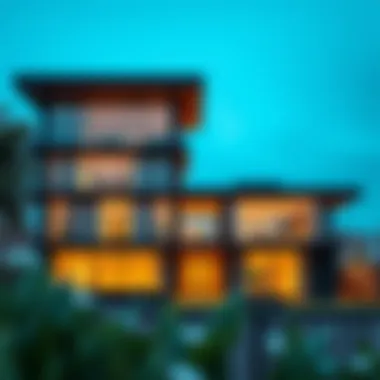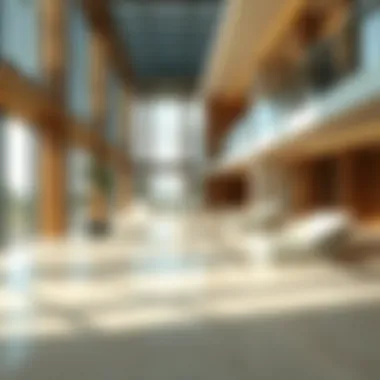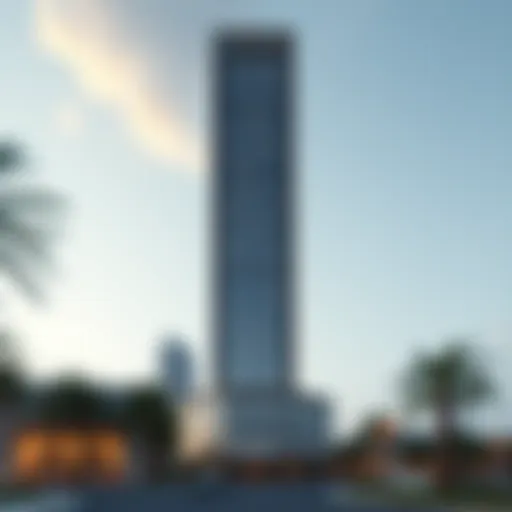Costs of Freehold Residency in the UAE for Two Years


Intro
In recent years, the allure of the UAE as a destination for investment and residency has caught the eye of many. With its bustling cities and stunning architecture, expatriates and investors are continually drawn to its opportunities. But amidst the sparkling skyline and vibrant culture, understanding the costs tied to obtaining freehold residency for a two-year period is crucial. This article aims to explore this landscape thoroughly, shedding light on not just the financial commitments but also the legal implications and market dynamics at play.
The journey begins with a closer look at market trends, examining the current climate and what predictions exist for the near future. Following that, we’ll shift gears and dive into various investment opportunities that could prove advantageous for those looking to make a foothold in the region. By the end, readers will be equipped with a well-rounded grasp of the costs associated, paving the way for informed decision-making.
Prelude to Freehold Residency in the UAE
The notion of freehold residency in the UAE carries significant weight, especially in the context of real estate and opportunities that come with it. As the real estate market beefs up, understanding this concept becomes vital for investors, expatriates, and those eyeing the UAE’s dynamic atmosphere. This article will dive into what freehold residency entails, emphasizing its relevance in the market and the perks associated with it.
Definition of Freehold Residency
Freehold residency allows foreign nationals to own property outright, something not available in many parts of the world. Unlike leasehold arrangements, where the land ownership remains with the Emirate and the lease is typically for a set number of years, freehold tenure grants complete ownership rights. So, if you’re investing in Dubai, for example, and decide to buy an apartment in Dubai Marina, you will hold the title as the full owner of that property, complete with rights to sell, develop, or lease it in accordance with local laws.
Importance of Residency in the Real Estate Context
Residency plays a critical role in real estate transactions in the UAE. When individuals or families choose to settle in the country, especially when looking to invest, several benefits emerge:
- Long-term Stability: With a freehold residency, property owners can enjoy a sense of permanence that can lead to better investment decisions. Knowing that your investment has a stable foundation adds peace of mind for many.
- Propelling Investment Opportunities: Freehold residency opens doors for wider market access. A foreign investor can capitalize on the rising demand for housing and commercial spaces, contributing significantly to their portfolios.
- Access to Lifestyle and Amenities: Freehold residents often enjoy integration into vibrant communities, filled with amenities. Living in a prime area with access to schools, healthcare, and entertainment can enhance quality of life and preserve property values.
Overall, understanding the implications and benefits of freehold residency enables prospective residents to navigate the Emirati real estate market with more confidence. As the landscape evolves, these insights become invaluable for making informed decisions that shape one’s future in the UAE.
Cost Breakdown for Two-Year Freehold Residency
Understanding the cost breakdown for securing a two-year freehold residency in the UAE is essential. This section will explore various financial aspects tied to the journey of obtaining residency, capturing crucial details that could shape investors’ and expatriates’ decisions. By laying out the application fees, housing costs across regions, and anticipated utility and maintenance expenses, potential residents will gain a clearer vision of the true financial landscape they may be stepping into.
Application Fees Overview
When diving into the application fees associated with freehold residency, it’s important to note that these costs can vary significantly depending on several factors, including application type and processing speed.
Typically, the application fees range from AED 1,000 to AED 3,000. In addition to standard fees, applicants may also encounter fees for medical fitness tests and biometrics, which can run another AED 500 to AED 1,000 combined.
The UAE government is meticulous about ensuring applicants meet certain health standards, which adds another layer to the costs. Keep in mind that processing times can impact overall expenses due to possible expedited requests, which can add hundreds of dirhams to your planned budget.
“Understanding that these initial costs can stack up is critical for anyone considering freehold residency; it’s not just about the fees but the potential for added expenses throughout the application process.”
Housing Costs in Different Regions
Housing costs in the UAE vary widely based on location, amenities, and overall neighborhood appeal. For those looking at freehold residency, understanding regional differences is vital.
Dubai
In popular areas like Downtown Dubai and Jumeirah, a one-bedroom apartment might set you back AED 80,000 or more annually, while neighborhoods such as Dubai Silicon Oasis could offer similar accommodations for about AED 50,000.
Abu Dhabi
In the capital, one might find that housing rates reflect the luxurious lifestyle the city promotes. Expect to pay approximately AED 70,000 for housing in Yas Island, while more suburban areas like Al Aman could be more affordable at around AED 50,000.
Sharjah and Other Emirates
As you move away from the bustling city vibes, costs typically decrease. In Sharjah, for example, renting a one-bedroom apartment can be around AED 30,000 annually. Thus, understanding varying costs can make a significant dent in your overall budget.
Comparison Summary
- Dubai: AED 50,000 to AED 80,000 annually
- Abu Dhabi: AED 50,000 to AED 70,000 annually
- Sharjah: AED 30,000 annually
Knowing these price ranges helps in strategizing finances and could mean balancing between comfort and investment value.


Utility and Maintenance Expenses
Utility expenses can often be an overlooked aspect of living costs. In the UAE, the general framework of utility costs can help paint a comprehensive picture of ongoing expenses.
Generally, you should anticipate monthly utility bills ranging from AED 300 to AED 800, depending on your usage. This includes electricity, water, and even cooling costs, particularly in summer months when AC units take a toll on energy consumption.
Moreover, setting aside money for routine maintenance of properties is wise, as this could entail anything from yearly service charges to occasional repairs. The charges for maintenance can vary, but budgeting around AED 1,500 to AED 5,000 yearly for upkeep could provide a cushion for unexpected issues.
As a quick recap:
- Monthly Utilities: AED 300 to AED 800
- Annual Maintenance: AED 1,500 to AED 5,000
Understanding these ongoing expenses can guide potential residents in making financially sound decisions and assist in long-term financial planning.
By carefully navigating through these costs, prospective freehold residents can steer clear of unexpected waves and set themselves up for a comfortable stay in the UAE.
Legal Considerations for Freehold Residency
In the realm of freehold residency in the UAE, navigating through legal considerations is not just advisable; it is essential. A solid grasp of the legal framework allows prospective residents to make informed choices, thereby minimizing unexpected hurdles down the line. Understanding the nuances of legal regulations helps not only in addressing residency applications but also in solidifying one’s rights as property owners within a foreign land. This section seeks to unearth the significant aspects of legal considerations, including the broader implications for residents and property investors.
Understanding the Legal Framework
The legal landscape surrounding freehold residency is mapped out by a combination of federal regulations and local laws. At the core of this framework lies the UAE Property Law, which outlines the rights and obligations of property owners, alongside the residency regulations established by the General Directorate of Residency and Foreigners Affairs (GDRFA).
Freehold properties, among them, refer to those which allow foreigners to own land outright, a unique feature of the UAE real estate market. This law is particularly crucial, say, for investors looking for long-term returns. But the legal framework also dictates criteria for eligibility, stipulating certain compliance requirements. For instance, to acquire freehold residency status, a foreign national generally needs to invest a minimum amount in real estate, and this criterion is pivotal in determining whether a prospective buyer qualifies for residency.
On top of that, regional regulations can apply. Each emirate may have distinct rules regarding property ownership, which can blur the lines for investors attempting to navigate what may initially seem straightforward. Therefore, consulting a legal expert familiar with both federal and local laws can be a sensible move.
Necessary Documentation for Applications
The documentation required for applying for freehold residency needs meticulous attention; missing even a single piece could send your application back to square one. Here’s a rundown of essential documents typically needed:
- Passport Copies: This includes original copies and possibly notarized versions to establish identity.
- Property Title Deed: Proof of ownership that verifies the applicant hsa invested in a property.
- Property Sale Agreement: This should outline the details of the purchase, including dates and parties involved.
- Proof of Funds: A recent bank statement or other financial documentation to confirm capability to cover living costs and any associated fees.
- NOC from the Developer: No Objection Certificates from the property developer are often mandatory to show that they agree to your application.
Completing the application requires careful proofreading and the right timing, as certain documentation may be time-sensitive.
Submitting an application should be strategized around the nuances of deadlines, especially if other permits are needed like a work visa or similar.
Important Note: Always make sure that the documentation is in line with the latest regulations; discrepancies could lead to delays or denials in the application process.
In summary, understanding the legal framework and compiling the necessary documents are paramount steps in securing freehold residency in the UAE. For expatriates and investors, it’s not merely about owning property, but also about establishing a stable footing in a country renowned for its dynamic market and vibrant opportunities.
Investment Opportunities Linked to Freehold Residency
Acquiring freehold residency in the UAE opens a wealth of investment opportunities for discerning investors. In a landscape where real estate is not just about having a roof over one's head, it’s about making informed financial decisions that can yield substantial returns. This section elucidates the promising advantages inherent in freehold residency and shines a spotlight on neighborhoods ripe for investment.
Advantages for Real Estate Investors
Investors often look beyond just the cost of properties; they seek potential, growth, and security in their investments. Freehold residency offers several valuable benefits:
- Ownership Security: Unlike leasehold agreements that can create uncertainties, freehold property ensures absolute ownership, which can increase the property’s resale value.
- Income Generation: Properties can serve as rental units, generating consistent revenue streams. Given the influx of expatriates, demand for rental accommodations remains robust.
- Market Stability: The UAE has made strides in stabilizing its real estate market. Freehold residency can be a hedge against economic fluctuations, particularly in urban areas like Dubai and Abu Dhabi.
- Accessibility: Investors enjoy smooth access to financing options that are more tailored and favorable compared to non-residents.
These advantages not only provide peace of mind but can lead to lucrative returns on investment.
Emerging Neighborhoods for Investment
When exploring where to invest, knowing the lay of the land can make all the difference. The UAE’s urban sprawl is continuously evolving, and some neighborhoods are emerging as hot spots for real estate investments:
- Dubai Marina: This area is a seasoned contender, with its cosmopolitan lifestyle attracting renters and buyers alike. The waterfront vistas and vibrant dining scene add to its allure.
- Jumeirah Village Circle (JVC): A more affordable, family-oriented neighborhood that’s rapidly developing, JVC has seen an uptick in demand due to its community-centric design and good transport links.
- Al Furjan: Closer to the Expo 2020 venue, Al Furjan showcases an array of contemporary homes. Its planned communities appeal to both expatriates and local residents.


"Investors must keep an eye on upcoming infrastructure developments, as these tend to have a direct impact on property values."
- Sharjah: While traditionally viewed as a more conservative alternative to Dubai, Sharjah is now attracting buyers looking for budget-friendly properties without compromising on quality.
- Dubai South: This area is positioned to benefit significantly from the Expo 2020 legacy, with ongoing developments aimed at boosting its economy.
Investing in these neighborhoods can offer potential skyrocketing returns as urban development continues. Savvy investors should conduct thorough market research and regularly review their strategies to align with trends.
In summary, linking freehold residency to investment opportunities transforms the way individuals approach real estate in the UAE. Understanding the landscape not only fosters smarter investment choices but also enhances the potential for achieving financial goals.
Comparative Analysis with Other Residency Options
Understanding the landscape of residency options in the UAE is crucial, not just for personal choices but also for investors and expatriates contemplating relocation. This analysis will not just scratch the surface but delve deep into why freehold residency stands out amid various alternatives. The decision of which residency route to pursue can have substantial ramifications on the lifestyle, financial obligations, and long-term plans of individuals.
Long-term Residency vs. Freehold
When comparing long-term residency options such as the UAE's long-term visa program to freehold residency, several key distinctions emerge. Long-term residency can typically last from five up to ten years, granting individuals a broader range of time to settle in. However, these visas generally involve specific conditions—like maintaining a job with a local company or a minimum income threshold. In contrast, freehold residency provides a more straightforward path that allows individuals to purchase property, creating a sense of permanence while fundamentally shifting their stake in the market.
The freedom associated with freehold residency means not just living in the country but having an investment that could yield benefits in a rising property market. This sort of investment leads to an intrinsic commitment to the UAE, unlike long-term residency where the individual may still feel somewhat transient, reliant on visa renewals.
There's also a financial aspect.
- Long-term visas may require continuous investments or employment, often making them feel like a means to an end.
- Freehold residency, however, entails the purchasing of property, which could serve as an asset or possibly a source of rental income.
Individuals weighing these options should keep in mind the nuances in regulations and obligations. The perception of stability versus flexibility can heavily influence one’s final decision, and it often boils down to personal priorities.
Short-term Visas Compared to Freehold Residency
In a rapidly globalizing world, short-term visas attract many who seek to explore the UAE without the burdens of long-term commitment. However, these visas often come with their own hurdles.
A short-term visa typically allows stays for up to three months, and works well for tourists or business travelers. Yet, the reality is they lack the security and community ties that freehold residency provides. Consider this—an expatriate on a short-term visa may find plans cut short at any moment due to work or immigration policies. In contrast, freehold residency offers more than mere shelter; it provides a foundation for establishing roots.
Advantages of freehold residency over short-term visas can include:
- Enhanced stability and security.
- The ability for family unification through property ownership.
- Potential investment returns in a luxuriant market.
Even the social aspects come into play, where a resident who has invested in property is likely to feel more integrated into the local culture—as opposed to someone who is just passing through.
Ultimately, the question isn’t just about what a person can afford; it’s about what a life worth living in the UAE looks like. The journey from being a transient visitor to a freehold resident carries weight, not only in monetary terms but also in lifestyle and identity.
Adopting the right residency approach sets the tone for your experience in the UAE—choose wisely.
Profile of Potential Residents
Understanding the profile of potential residents is crucial within the framework of freehold residency in the UAE. This not only informs interested individuals about who typically qualifies for such residency but also paints a broader picture of what drives people to seek out freehold options in a dynamic real estate market. With this knowledge, stakeholders can better tailor their offerings and marketing strategies to meet the demands of these demographic segments.
Expatriates Considering Relocation
Expatriates are among the most significant groups of potential residents in the UAE, drawn in by the word of opportunities that the region presents. Many view freehold residency as the golden ticket to establishing roots in an economy that boasts no income tax and a sophisticated lifestyle.
When contemplating relocation, expatriates often weigh several factors:
- Career Prospects: The burgeoning job market in various sectors often serves as a magnet for those looking to upgrade their professional life.
- Quality of Life: Access to world-class amenities, healthcare, and education can be alluring for families.
- Cultural Diversity: The multicultural environment in the UAE offers a unique melting pot experience, where different backgrounds coexist.
However, adapting to life in the UAE does present challenges. The heat can be quite oppressive during certain months, and cultural norms might differ significantly from those of their home countries. Understanding these nuances is vital for expatriates as they plot their course in this unfamiliar land.
Furthermore, housing options may vary widely depending on the area. For example, neighborhoods like Dubai Marina offer vibrant lifestyles but can come with a heftier price tag compared to quieter settings like Jumeirah Village Circle. This spark of knowledge can serve as a guiding light in their housing decisions.
Wealthy Individuals Exploring Investment Mobility


For wealthy individuals, freehold residency represents more than just a change of scenery; it's often about strategic investment mobility. In today's globalized society, the wealthy are constantly hunting for opportunities that could potentially yield substantial returns. Securing residency as a freeholder can be a smart way to not only invest in real estate but also to benefit from the stable economic environment in the UAE.
Here are some key considerations for this demographic:
- Real Estate as an Asset Class: Many wealthy individuals view property in the UAE as a long-term investment to diversify their portfolios. They appreciate the stability of property values compared to other investment vehicles like stocks.
- Tax Advantages: The absence of personal income taxes in the UAE is a draw for high-net-worth individuals, allowing them to maximize their wealth without the burden of additional taxation.
- Networking Opportunities: The UAE acts as a hub for international business, providing invaluable networking avenues that can open doors to various exponential business ventures.
On the downside, market volatility can pose a risk. With fluctuating property values impacted by both local and global economic conditions, wealthy investors must remain vigilant and informed. Additional market research and consultation with knowledgeable real estate agents can safeguard against making poor investment decisions.
In summary, identifying the profile of potential residents allows investors, agents, and developers to tailor their services accordingly. By comprehending what expatriates and wealthy individuals seek, they can build connections and foster an environment that benefits all parties involved. This insight is vital in navigating the complexities of freehold residency within the UAE's unique backdrop.
Possible Challenges and Barriers
Navigating the landscape of freehold residency in the UAE comes with its own set of challenges and barriers that anyone considering this endeavor should be acutely aware of. A thorough understanding of these challenges is crucial, as they not only impact potential residents but also shape the broader real estate market dynamics. This section sheds light on both cultural and social adaptation concerns, as well as the factors of market volatility and economic considerations that can significantly affect one’s experience and investment.
Cultural and Social Adaptation Concerns
Relocating to a new country is about more than just bricks and mortar; it's about assimilating into a new cultural fabric. Those hailing from vastly different backgrounds may find themselves at odds with local customs, social norms, or even typical day-to-day practices. For instance, food, attire, and family structure can vary wildly between cultures, leading to feelings of isolation if not navigated properly.
Many expatriates report that social circles tend to form along cultural lines, which can make integration challenging. Not everyone may find it easy to forge connections with locals or even with fellow expatriates outside their immediate cultural group. Besides, language can also be a barrier. While English is widely spoken in many sectors, peculiarities in dialects or phrases can lead to misunderstanding, potentially complicating everything from securing housing to negotiating contracts.
Here are factors to consider regarding social adaptation:
- Language Proficiency: Understanding local dialects or even basic phrases can ease social interaction.
- Cultural Sensitivity: Familiarizing oneself with local customs, especially during major Islamic holidays or national events.
- Community Initiatives: Engaging in local community events could bolster one's sense of belonging.
The longer residents remain isolated within their familiar pods, the harder it might be to make the UAE feel like home. It’s wise to proactively seek out events or groups that share similar interests or backgrounds to start building a network.
Market Volatility and Economic Factors
The UAE's property market is notoriously fickle, swaying with global economic tides and local regulations. Market volatility can pose substantial risks to those entering into freehold residency, particularly investors seeking stable returns. An understanding of the current economic climate and market trends can provide clarity and perhaps a roadmap to mitigating these risks.
Real estate values have been historically defined by market cycles driven by factors such as:
- Oil Prices: As a significant portion of the UAE's economy is reliant on oil, fluctuations in oil prices can ripple through to affiliated sectors like real estate.
- Regulatory Changes: Policies governing property ownership and residency can shift, affecting the attractiveness of investments.
- Global Economic Trends: Economic downturns or growth in pivotal markets like Europe or Asia can influence foreign investment levels in UAE properties.
Potential investors or residents should ask themselves:
- Is there enough flexibility in my investment strategy to adapt to market shifts?
- Have I thoroughly researched the latest regulations impacting freehold properties?
- How can I effectively strategize around market instability to ensure long-term viability in my investment?
Understanding these economic nuances helps frame the larger picture of freehold residency in the UAE, guiding potential residents in making savvy, informed decisions.
In summary, the road to freehold residency in the UAE isn’t all smooth sailing. Awareness of cultural adaptation challenges and market volatility empowers investors and expatriates alike to better prepare for, and navigate, the intricacies that come with establishing a foothold in this bustling region. This scope of consideration ensures that individuals remain not just passive participants, but empowered agents of their own real estate journeys.
Epilogue on the Freehold Residency Landscape in the UAE
The significance of understanding the landscape of freehold residency in the UAE cannot be overstated. This concept encapsulates more than merely acquiring property; it represents a gateway to a new life in a rapidly evolving marketplace. With the economic trajectory of the UAE, freehold residency can serve as a stepping stone for expatriates and investors alike, making it imperative to grasp its intricacies.
In synthesis, the costs encompassed within the freehold residency framework include application fees, housing costs, and various utility expenses, all of which play a vital role in the overall investment decision-making process. Those looking at residency must consider the legal frameworks that govern property ownership, as well as the potential cultural integration challenges. Thus, weighing these factors is key for any prospective resident, ensuring that every penny spent aligns with personal goals and aspirations.
“Investing in freehold residency is not just a financial commitment; it's a step towards establishing roots in a bustling hub of opportunity.”
By casting a light on legal and market aspects, the article cuts through the complexities, rendering the path to residency clearer. Notably, emerging investment opportunities and neighborhoods can be earmarked by careful consideration, positioning potential residents to make fruitful choices.
Synthesis of Key Points
Reflecting on the information covered throughout the article:
- Costs and Fees: Prospective residents should begin by delineating the various costs associated with application, housing, and maintenance to avoid surprises down the line.
- Legal Aspects: Understanding the local legal landscape is critical to ensure compliance and secure ownership rights that are essential for long-term investment.
- Cultural Adaptation: Acquainting oneself with cultural nuances can help ease the transition for expatriates. Knowing how to navigate social dynamics contributes significantly to comfort and success in the new environment.
- Market Trends: Staying attuned to market fluctuations and possible economic shifts can provide leverage and opportunities that might otherwise be overlooked.
Future Considerations for Potential Residents
Looking ahead, future residents must equip themselves with a mindset geared toward adaptability. The UAE is known for its dynamic property market, meaning that potential investors should remain vigilant and responsive to changes, be they regulatory or demographic shifts. Some key considerations include:
- Long-term Vision: Consider not only immediate costs but also the potential for property value appreciation.
- Networking: Developing local contacts can provide insights into market trends and future investment opportunities.
- Sustainability: A growing trend towards sustainable living is emerging; potential residents should explore options that align with eco-friendly practices and invest in developments that embrace sustainable architecture.
- Regulatory Changes: Always keep an eye on potential legislative changes that could affect residency status or property ownership.
This combination of foresight, adaptability, and understanding of costs and benefits will equip potential residents to make informed and strategic choices. The landscape of freehold residency in the UAE can indeed be navigated successfully, steering one towards a promising future in this vibrant nation.







